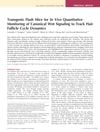 9 citations,
May 2015 in “Cardiology Clinics”
9 citations,
May 2015 in “Cardiology Clinics” The conclusion is that managing cholesterol is important for women, especially during pregnancy, breastfeeding, and with PCOS, and involves regular screening and careful treatment choices.
 May 2002 in “British Journal of Dermatology”
May 2002 in “British Journal of Dermatology” A pregnant woman's skin condition improved after giving birth, possibly due to high estrogen levels during pregnancy.
[object Object]  January 2000 in “Expert Opinion on Therapeutic Patents”
January 2000 in “Expert Opinion on Therapeutic Patents” The document highlights various patents for new compounds with potential treatments for multiple diseases, including cancer, hormonal disorders, and diabetes.
 116 citations,
December 2017 in “International Journal of Women's Dermatology”
116 citations,
December 2017 in “International Journal of Women's Dermatology” Adult female acne treatment should be personalized, considering individual preferences and pregnancy, using various topical and oral medications while managing side effects and resistance.
 86 citations,
March 1993 in “Toxicology and Applied Pharmacology”
86 citations,
March 1993 in “Toxicology and Applied Pharmacology” Finasteride affects male rat genitalia development, causing abnormalities during specific pregnancy days.
 26 citations,
October 2014 in “Andrologia”
26 citations,
October 2014 in “Andrologia” Infertile men are more likely to produce sperm with abnormal chromosome numbers, which can affect pregnancy success and embryo health.
 14 citations,
October 2016 in “Physiological Research”
14 citations,
October 2016 in “Physiological Research” Alfacalcidiol and metformin together lowered testosterone in women with PCOS, but did not significantly improve acne, hair growth, or pregnancy rates.
 12 citations,
April 2018 in “Revista Brasileira de Ginecologia e Obstetrícia”
12 citations,
April 2018 in “Revista Brasileira de Ginecologia e Obstetrícia” Women with Systemic Lupus Erythematosus should have closely monitored pregnancies and avoid certain medications to improve their pregnancy outcomes.

Different drugs are used to manage breeding, prevent or end pregnancy, and treat reproductive issues in dogs and cats.
 171 citations,
October 1990 in “Alcoholism/Alcoholism, clinical and experimental research”
171 citations,
October 1990 in “Alcoholism/Alcoholism, clinical and experimental research” The document concludes that the exact way alcohol causes harm to fetal development is unknown, but it significantly affects nutrient transport to the fetus and a safe level of alcohol during pregnancy is not determined.
 18 citations,
December 2014 in “Obstetrics and Gynecology Clinics of North America”
18 citations,
December 2014 in “Obstetrics and Gynecology Clinics of North America” Losing 5-10% body weight can improve PCOS symptoms, letrozole is better than clomiphene for fertility, and managing weight and blood sugar is important to reduce pregnancy complications.
 10 citations,
June 2006 in “Fertility and Sterility”
10 citations,
June 2006 in “Fertility and Sterility” The conclusion is that metformin is a first-line treatment for PCOS, particularly for restoring ovulation and increasing pregnancy rates, with other treatments depending on specific symptoms.
 March 2021 in “Clin-Alert”
March 2021 in “Clin-Alert” The FDA warned about safety issues with remdesivir and tofacitinib, finasteride is linked to suicidality, potent topical corticosteroids increase osteoporosis risk, henna can cause hemolysis in G6PD deficiency, chemotherapeutic agents can cause adverse reactions, drug interactions are common in cancer patients, ketamine can reduce at-risk drinking, high dose of anticholinergics increases dementia risk in Parkinson's patients, and prenatal exposure to second-generation antipsychotics increases pregnancy complications.
 42 citations,
January 1998 in “BioDrugs”
42 citations,
January 1998 in “BioDrugs” Azathioprine's effectiveness and safety require careful monitoring and more research, especially regarding its use with corticosteroids and the role of TPMT status in patients.
 January 2021 in “Journal of Allergy and Therapy”
January 2021 in “Journal of Allergy and Therapy” Electric Follicle Stimulation may promote hair growth and density with no known side effects.
 December 2001 in “Fertility and Sterility”
December 2001 in “Fertility and Sterility” The book provides a clear overview of PCOD and is recommended for medical trainees and clinicians, but may lack depth for advanced researchers.
 46 citations,
July 1988 in “Journal of The American Academy of Dermatology”
46 citations,
July 1988 in “Journal of The American Academy of Dermatology” Hormone imbalances can cause specific skin changes, which may help in early detection of endocrine disorders.
 34 citations,
May 2013 in “Journal of the European Academy of Dermatology and Venereology”
34 citations,
May 2013 in “Journal of the European Academy of Dermatology and Venereology” Hair growth slows and shedding increases after childbirth, but most women don't experience excessive hair loss.
 19 citations,
January 2016 in “Dermatology Research and Practice”
19 citations,
January 2016 in “Dermatology Research and Practice” The study concluded that hair loss in Indian women is not significantly linked to anemia or thyroid problems, but checking thyroid function could help those with ongoing hair loss.
 14 citations,
May 2011 in “Facial Plastic Surgery Clinics of North America”
14 citations,
May 2011 in “Facial Plastic Surgery Clinics of North America” Laser hair removal is effective for dark hair but needs improvement for nonpigmented or fine hairs.
 2 citations,
January 2002 in “Hormone Research in Paediatrics”
2 citations,
January 2002 in “Hormone Research in Paediatrics” Molecular diagnostics help identify genetic defects causing endocrine diseases, improving diagnosis and treatment options.
45 citations,
January 2010 in “Forensic science international” Neonatal hair can help determine drug exposure during pregnancy.
 16 citations,
February 2014 in “Journal of Investigative Dermatology”
16 citations,
February 2014 in “Journal of Investigative Dermatology” Researchers developed a mouse model that tracks hair growth using bioluminescence, improving accuracy in studying hair cycles.
 10 citations,
January 2018 in “Seminars in Reproductive Medicine”
10 citations,
January 2018 in “Seminars in Reproductive Medicine” The document concludes that women with PCOS need a comprehensive care model that covers reproductive, metabolic, and psychological health to improve their quality of life.
[object Object]  1 citations,
January 2018 in “PubMed”
1 citations,
January 2018 in “PubMed” Women with PCOS have a similar chance of getting pregnant using assisted reproductive treatment as those without PCOS.
 March 2024 in “Frontiers in reproductive health”
March 2024 in “Frontiers in reproductive health” Women of color in Northern Manhattan view hair care as important to their identity and culture, and education on harmful chemicals in hair products is needed.
 January 2019 in “Springer eBooks”
January 2019 in “Springer eBooks” Acne can appear or persist in adulthood due to hormonal changes, external factors, or substance use, and requires appropriate treatment.
 July 2015 in “Cambridge University Press eBooks”
July 2015 in “Cambridge University Press eBooks” The document concludes that careful history and physical exams are crucial for accurately diagnosing polycystic ovary syndrome and distinguishing it from other similar conditions.
 December 2011 in “The Diabetes Educator”
December 2011 in “The Diabetes Educator” The Blood Glucose Management Service improved patient safety and outcomes in managing blood sugar in hospitalized patients.
 82 citations,
March 1994 in “Archives of Dermatology”
82 citations,
March 1994 in “Archives of Dermatology” 2% topical minoxidil effectively treats female hair loss with minimal side effects.





























